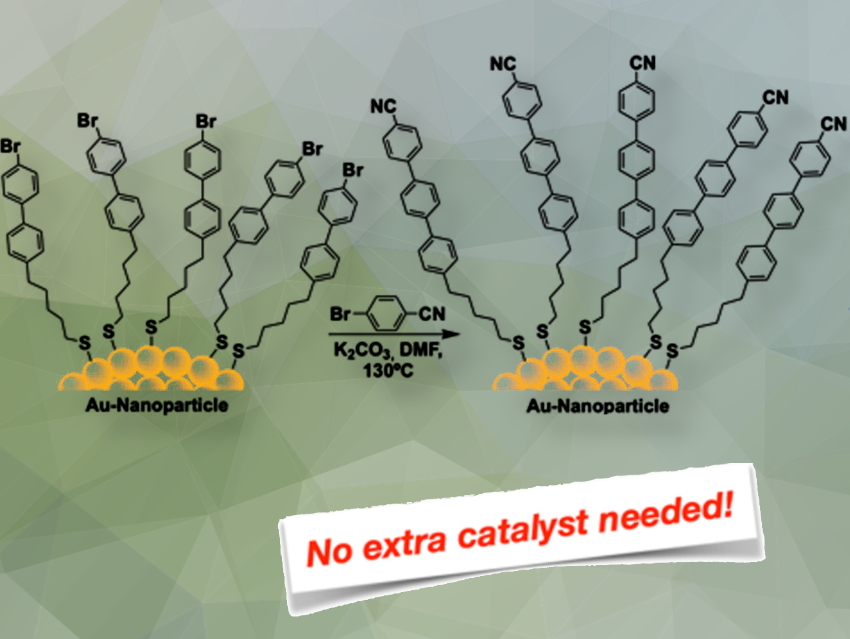Reactions on surfaces have not been as well explored as organic reactions in solution. Hermann A. Wegner, Professor of Organic Chemistry at the Justus Liebig University Giessen, Germany, and colleagues have expanded the scope of organic on-surface synthesis by using the surface-assembled monolayer (SAM) technique to achieve selective hetero-Ullmann coupling over homo-coupling on thiol-functionalized gold nanoparticles. SAM creates a single layer of molecules bonded to a solid surface, allowing precise control over surface properties and interactions.
What did you do?
We have developed a method to perform Ullmann coupling reactions on gold nanoparticles functionalized with thiol groups. This reaction involves creating carbon–carbon bonds between aromatic molecules directly on the surface of the nanoparticles.
The gold nanoparticles serve multiple roles: they act as the reactant, stabilizing agent, catalyst, and reducing agent. By carefully arranging the ligands on the nanoparticles, we achieved selective coupling reactions, favoring the formation of hetero-coupled products over homo-coupled ones.
Why are you doing this?
We are exploring new ways to conduct organic reactions on surfaces, expanding beyond traditional solution-based chemistry. Our goal is to create functional materials that can be directly integrated into devices, enhancing their performance and enabling new technological applications. By performing these reactions on gold nanoparticles, we aim to achieve greater control and selectivity in the synthesis of complex organic structures.
What is new about it?
What’s novel about our work is the ability to use gold nanoparticles as multifunctional agents in Ullmann coupling reactions. We exploited the formation of surface-assembled monolayers (SAMs) on the nanoparticles to achieve high selectivity for hetero-coupling reactions, which is typically challenging in traditional in-solution synthesis. This opens up new possibilities for organic on-surface synthesis and the creation of hybrid organic–inorganic materials.
What is the main significance of your results?
Our key findings include:
- Demonstrating selective hetero-Ullmann coupling reactions on the surface of these nanoparticles.
- Confirming that the nanoparticles remain stable and retain their functionality after the reaction.
- Providing a new approach to achieving selective organic reactions on surfaces, which can be used to create advanced materials with tailored properties.
What is the longer-term vision for your research?
Our research demonstrates the potential of nanoparticles as versatile platforms for conducting complex organic reactions. This approach could be extended to other types of reactions and nanoparticles, paving the way for innovative developments in materials science and nanotechnology.
We believe that our work represents a significant step forward in the field of organic on-surface synthesis, opening up new avenues for scientific exploration and technological innovation.
We envision several applications for our research, including:
- Creating functionalized nanoparticles for use in electronic, optical, and sensing devices.
- Advancing materials science through the design of hybrid organic–inorganic materials with specific properties for use in nanotechnology and biotechnology.
What is your longterm vision?
Our long-term vision is to integrate these materials into practical devices, enhancing their capabilities and enabling new technologies.
What part of your work was the most challenging?
The most challenging part of our work was the analytics following the on-surface process. Classical organic techniques, such as NMR spectroscopy or mass spectrometry are not sufficient.
Thank you for these insights.
The article they talked about
- Ullmann Coupling Reactions on Gold Nanoparticles,
Nathaniel Ukah, Hermann A. Wegner,
ChemistryEurope 2024.
https://doi.org/10.1002/ceur.202400024

Hermann A. Wegner is Professor of Organic Chemistry at the Justus Liebig University Giessen, Germany




